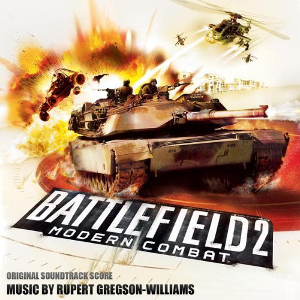Battlefield 2 -Modern Combat- Original Videogame Score
 |
Album Title: Battlefield 2 -Modern Combat- Original Videogame Score |
| Record Label: Electronic Arts |
|
| Catalog No.: N/A |
|
| Release Date: December 19, 2006 |
|
| Purchase: Download at iTunes |
Overview
Battlefield 2: Modern Combat was much more than just a port of Battlefield 2 from PCs to consoles. In addition to introducing single-player gameplay, the title featured a graphical overhaul and a brand new score. Rather than rely on their internal sound team, Digital Illusions decided to outsource to an experienced cinematic composer: Rupert Gregson-Williams. While not as well-known as his brother Harry, he still had a string of notable titles on his resumé, including the film Hotel Rwanda and the television series William and Mary. How did his first — and, to date, only — video game score pan out?
Body
There are clear parallels between Rupert Gregson-Williams’ work on Battlefield 2: Modern Warfare and his brother’s work on Metal Gear Solid 2: Sons of Liberty. Right from the “BF Menu Music”, the composer casts away the low-fi military orchestrations of the original game in favour of a modern cinematic sound. He retains the focus on epic brass melodies and punchy bass lines, but uses high quality orchestral samples and hybridises them with cutting-edge electronics. The choral climax of the composition, while short-lived, is especially striking. The music isn’t quite as memorable as the series’ main theme, but it’s still an entertaining introduction.
The music for Battlefield 2: Modern Combat takes a much more central role in the gameplay than previous Battlefield titles. As a result, there are tracks such as “Head Shot” and “Heavy Tonnage” that provide a adaptive accompaniment to the gameplay. Both undergo impressive transformations from their tense and ambient openings — focusing mostly on ostinati and percussion — to their powerful climaxes featuring heavy beats and electrifying guitars. The scoring approach will be familiar to anyone that has heard a military score by Remote Control Productions and thus the tracks may tire those looking for musical ingenuity. However, the adaptive development ensures these tracks work wonderfully in the game and, spanning up to six minutes, are also substantial stand-alone highlights.
Given the game focuses on a war against China, there are plenty of tracks that hybridise Eastern and Western features. On “Zone 2 China”, Rupert Gregson-Williams combines samples of traditional Chinese instruments with the pumping electro-orchestral stylings featured elsewhere on the score. The oriental references are nevertheless brief and subdued, perhaps preserving some tension before the climax. These elements are much more central in “China Final” and, while not tremendously authentic in writing, certainly evoke a sense of being in China. What’s most impressive about the track is how it subtly thickens and accelerates during its unprecedented nine minute playtime to fully capture the climax of the gameplay.
The action themes on the soundtrack are more focused on stealth than confrontation. “Bunker Bust” and “River Mission” are two similarly styled tracks that use fast-paced percussion to yield interestingly a slow, cautious outcome. Once again, there are obvious parallels to the modern scores of the Metal Gear Solid series. There are also more bold and striking action scores such as “Big Bang” that briskly interweave orchestration with electronics. There’s nothing novel here, but the modern cinematic sound certainly fits the game’s setting and technology. “NATO Final” is perhaps the most notable action score, as it feels both heroic and grand due to the bombastic percussion and heroic strings. It also sounds more sympathetic due to the beautiful resounding leads.
Summary
Those that follow the soundtracks of Remote Control Productions will find nothing new here. However, Battlefield 2: Modern Combat is still a better-than-average example of their electro-orchestral approach to military scoring: there are some memorable themes to be found, the blend of traditional and contemporary elements is well done, and the adaptive nature of the music adds breadth to the soundtrack release. It’s right up there with Metal Gear Solid’s iconic soundtracks in terms of style and quality.
Do you agree with the review and score? Let us know in the comments below!
4
Posted on August 1, 2012 by Harris Iqbal. Last modified on January 22, 2016.














